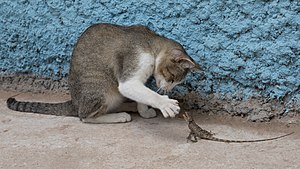
Cats are lovely animals. Unfortunately, as pets they may have an impact on the local environment that can be problematic if not managed properly. Suggestions for caring for your cats in a way that is sustainable and considerate of the local environment are offered in this article.
Cats are one of the few animals content to reside alongside the human being in a mutually beneficial relationship. As such, any discussion of their worthiness as a pet in a particular environment must account for the long-held interrelationships between people and cats, a relationship that works for many people. The problems caused by cats do not excuse scapegoating cats in place of acknowledging the choices and actions that human beings do to diminish environmental quality and safety. Focus most on what can be done to ensure the cat is safe, happy and not causing environmental problems.
Keeping the local wildlife safe from your cats[edit | edit source]
- Arranging a garden for bird and small native mammal safety
- Providing cat runs (enclosing cats when outdoors) - this is required by law in some jurisdictions
- Benefits of getting rid of rats and mice might be worth covering
- The colourful scrunchie collars for cats in colours birds can see and be warned off by (cats don't care about fashion statements)
Caring for cats in a sustainable way[edit | edit source]
- Feeding - cats are obligate carnivores, so vegan diets are not considered that kind to them but there are people who use taurine supplements; any discussion along these lines would need reliable referencing. Don't overfeed cats, feed right sort of food that fills them up to prevent demanding cats (does higher quality food result in less waste [poo])? Don't buy foods shipped from long distances, etc. (similar to local food movement)
- Would it be worth adding some healthy, sustainable cat food recipes here?
- Listing sustainable cat food companies? Worthwhile?
- http://www.catster.com/lifestyle/sustainable-pet-ownership-sustainability-cats-meat-cat-food
- Litter options - what eco-friendly options are there? What to do with cat poo? Can cat poo be composted in own container?
- Training cats to use a toilet (not so inter-species hygienic but possible) - it's possible to train cats to use normal toilets, through the Litter Kwitter (the health aspects of this must be covered, the "cute factor" of this habit tends to overshadow the potential for disease/worm/pest transference between cat and human)
- Spaying and neutering cats; all pet/companion cats can live perfectly happily without reproducing. Equally, obtain kittens/cats from animal welfare shelters, to ensure that they get a home
- Worming, vaccinating cats regularly to prevent health hazards to themselves and to humans
- Carbon footprint of pet ownership - this might be best as a separate article but could be referenced back to this
- Make cat toys from recyclable items such as scrap fabrics sewn by hand into mouse shapes stuffed with homegrown catnip; if you must buy toys, choose those from companies with sustainable practices. Better yet, buy from local craftspersons who make cat toys from scraps/recycled products. Cats are happy with toilet rolls, sticks, plants, etc.
- Know which plants are safe for cats and which are not. Could do a list here.
Providing cat-friendly garden zones[edit | edit source]
- Growing a cat-friendly plant section of the garden to encourage cats to spend their time there (not bothering other areas or species)
- Making safe structures for cats
- Keeping cats enclosed makes for happier neighbours too; also lowers risk of escape into environment (which is rare if the cat is well loved and cared for though)
Building cat houses and cat runs[edit | edit source]
- Perhaps some ideas here for keeping cats inside things and not near the wildlife
- Cat condos/play gyms
See also[edit | edit source]
- http://www.theguardian.com/sustainable-business/reduce-pets-sustainable-future-cats-dogs - this article's rough on pet ownership, appears purposefully provocative - IMHO comparing interspecies relationships with improved social capital misses the mark - both matter. However, it has some interesting points about improved licensing, pet sharing, reduction of amounts of pets owned, etc. Here's a really out there idea - if you love cats, why not devote time to volunteering in a country that needs helpers to assist with big cat survival?
- http://www.southernfriedscience.com/?p=10021 - some ideas about what a sustainable pet is. Companionship as a service too (the human need to see services in everything)
- http://www.organicauthority.com/pets/green-sustainable-kitty-litter-alternatives-natural.html - sustainable kitty litter alternatives